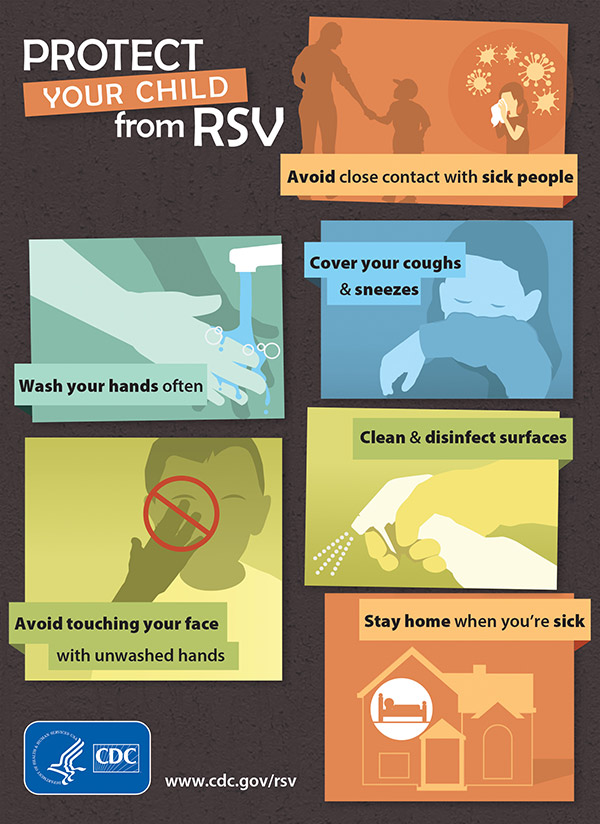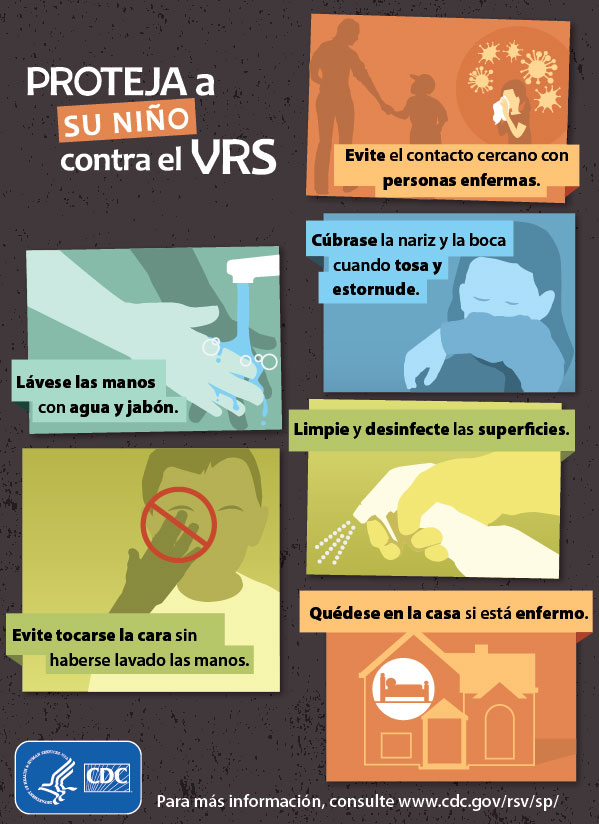WHAT IS RESPIRATORY SYNCYTIAL VIRUS (RSV)?
Respiratory syncytial virus (RSV) is a common respiratory illness that typically causes mild, cold-like symptoms. Most people recover in a week or two, but RSV can be serious. Infants and older adults are more likely to develop severe RSV and need hospitalization. Vaccines are available to protect older adults from severe RSV. Monoclonal antibody products are available to protect infants and young children from severe RSV.
RSV FACTS:
RSV Spreads through droplets when an infected individual coughs or sneezes
RSV can be spread by kissing an infected individual
RSV can survive on hard surfaces such as tables and toys for many hours
RSV season typically starts in the fall and peaks in the winter
Almost all children will have had an RSV infection by their 2nd birthday
RSV SYMPTOMS INCLUDE:
Runny nose
Coughing
Sneezing
Fever
Wheezing
Decreased appetite
In very young infants, the only symptoms may be irritability, deceased activity, and breathing difficulties
Symptoms typically begin 4 to 6 days after someone is infected
RSV PREVENTION
Cover your coughs and sneezes
Wash your hands often with soap and water
Avoid close contact with other who are showing symptoms
Clean frequently touched surfaces
CDC now recommends an RSV vaccine for everyone ages 75 and older and adults ages 60 - 74 at increased risk of severe RSV.
- Adults 60 - 74 who are at increased risk include those with chronic heart or lung disease, certain other chronic medical conditions, and residents of nursing homes or other long-term care facilities.
- RSV vaccination is currently recommended as a single lifetime dose only. Persons who have already received RSV vaccination are not recommended to receive another dose.
- The best time to get vaccinated is late summer and early fall - before RSV activity increases.
- For full RSV vaccination guidelines for older adults, visit www.cdc.gov/vaccines/vpd/rsv/hcp/older-adults.html Source: CDC Healthcare Providers: RSV Vaccination for Adults 60 Years of Age and Over | CDC
CDC recommends all children younger than 8 months receive a monoclonal antibody (nirsevimab) to protect them in their first RSV season. If your child is at increased risk for severe RSV disease, talk to their doctor to determine if additional doses of monoclonal antibodies are recommended for your child (aged 8 to 19 months) as they enter their second RSV season.
Monoclonal antibodies are not vaccines. They provide an extra layer of defense that helps fight RSV infections and protect children from getting very sick. The protection these antibodies provide wanes over time. These products are not treatments for a child who already has RSV infection.
RESOURCES | |
|---|---|
| Respiratory Syncytial Virus (RSV) - CDC | Respiratory Syncytial Virus (RSV) Fact Sheet - PADOH |
 |  |
For more information and assistance, the Delaware County Health Department Wellness Line is available 24 hours a day, 7 days a week. In addition to responding to phone calls, the Wellness Line also responds to email inquiries.
Phone: (484) 276-2100 (Available 24/7)
Email: DelcoWellness@co.delaware.pa.us